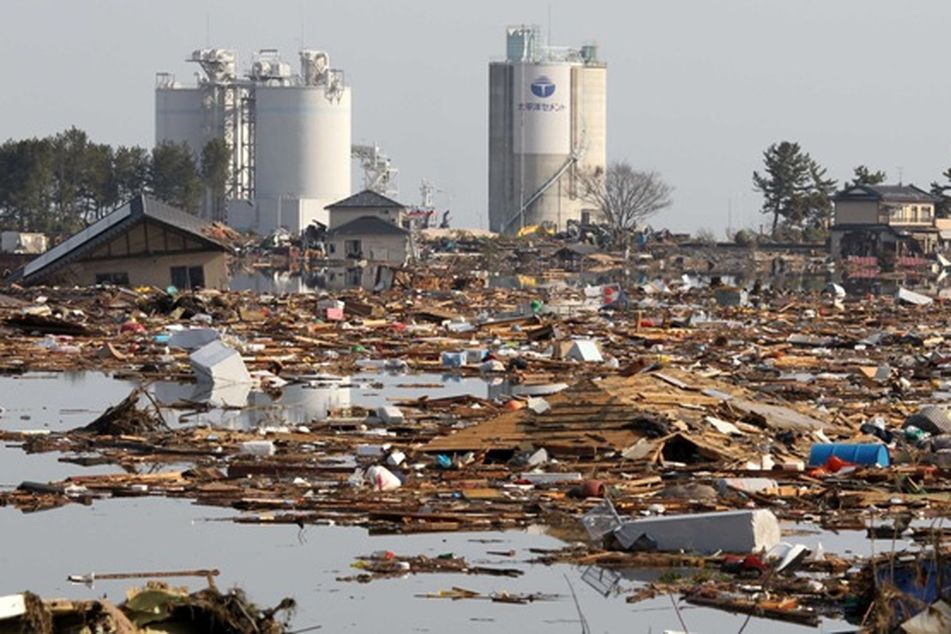Nuclear-power stocks suffer meltdown in wake of Japan quake
 Damage in Fukushima, the city where the crippled power plants are located. (Bloomberg News)
Damage in Fukushima, the city where the crippled power plants are located. (Bloomberg News)
But alternative-energy shares getting a boost from renewed fears about atomic energy.
Mounting fears about the safety of nuclear power in the wake of the natural disaster in Japan is causing a sell-off in nuclear-power stocks. Conversely, alternative-energy stocks and exchange-traded funds have been boosted — a trend that experts predict will continue over the coming months.
The 9.0 magnitude earthquake and subsequent tsunami that devastated parts of Japan have caused power failures in three nuclear plants, prompting worldwide concerns about the safety of nuclear energy. While Japanese officials maintain that they have the situation contained, government authorities also have appealed for international assistance in averting a core meltdown in the plant located in Fukushima, which is operated by Tokyo Electric Power Co. Meanwhile, both Germany and Switzerland today announced moratoriums on plans to build and replace nuclear plants, while in the U.S., Rep. Ed Markey, D-Mass., issued recommendations for overseeing nuclear power.
“The tragic events now unfolding in Japan could very easily occur in the United States,” he said in a statement.
As a result of the growing concerns, stocks in the U.S. and Europe plunged on Tuesday, following Japanese shares lower after the Nikkei 225 index posted its biggest two-day drop since 1987, amid concern a nuclear accident outside of Tokyo may cripple the global economy. Commodities slid and Treasuries jumped.
The MSCI World Index fell 3.7 percent, while the Nikkei dropped 10.6 percent to the lowest since April 2009 and the Standard & Poor’s 500 Index tumbled 2.6 percent, the most since August. Ten-year Treasury yields slid 11 basis points to 3.25 percent and the two-year German note yield fell 15 basis points, adding to its longest run of declines since November 2009.
In the U.S.,funds that invest in nuclear energy have been hammered. Market Vectors Nuclear Energy ETF Ticker:(NLR) was down nearly 13% in afternoon trading on Monday. Likewise, iShares S&P Global Nuclear Energy Portfolio ETF Ticker:(NUCL) was off more than 11% from its opening price Monday. The Global X Uranium EFT Ticker:(URA) plunged 18% on Monday.
At the same time, alternative-energy ETFs and stocks saw a big run-up in price.
For example, Guggenheim Partners LLC’s Solar ETF Ticker:(TAN) was up 6.11% and the Market Vectors Solar Energy ETF Ticker:(KWT) was up 6.46% in late afternoon trading yesterday.
With the price of oil already hovering at around $100 a barrel, largely due to tensions in the Middle East, alternative energy has become more attractive over the past few weeks, experts said.
“Traditionally, the cost of producing alternative energy is much higher than the cost of oil, but as oil gets more and more expensive, alternative energy becomes more attractive,” said Axel Merk, president and chief investment officer of Merk Investments LLC.
Specifically, companies that create parts for solar panels are seeing a rise in their share prices. Ten percent of the world’s production of polysilicon, a key raw material for solar production, comes from Japan, said Matthew Page, co-portfolio manager of Guinness Atkinson Asset Management Inc.’s Global Alternative Energy Fund Ticker:(GAAEX). With production in Japan down, other companies are starting to reap the rewards of increased demand, he said.
MEMC Electronics Materials Inc. Ticker:(WFR), a polysilicon producer, saw its stock price jump nearly 11% on Monday. The share price of another polysilicon provider, ReneSola Ltd. Ticker:(SOL), was up 4.25% as well.
In the long term, the disaster in Japan may force other countries, such as the U.S., to create policy in favor or renewable energy, said Tom Lydon, president of Global Trends Investments. “Maybe one of the benefits of all of this is that the importance of clean energy will come to the forefront,” he said.
Even in the best-case scenario — where Japan manages to avoid a nuclear meltdown — the cost of nuclear power will rise as a result of this incident, experts said.
“It will raise the cost of nuclear energy because any new plants will require an extra layer of security,” said Ivka Kalus-Bystricky, portfolio manager of the Pax World International Fund Ticker:(PXINX). “That means at the margin, alternative energy becomes more attractive.”
Learn more about reprints and licensing for this article.




